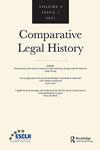Corpus linguistics: the digital tool kit for analysing language and the law
IF 0.5
Q2 LAW
引用次数: 0
Abstract
Corpus linguistics methodologies offer innovative ways of reading legal historical sources. Studying the language of source texts using computational techniques that retrieve linguistic data makes detailed searches of words, phrases, and lexical/grammatical patterns and structures possible and provides multiple contextual data that is both quantitative and qualitative, empirical rather than intuitive. It helps us understand not just what is being said, but also how it is being said, how language is used to encode meanings, and what that can tell us about underlying contents and the socio-political, cultural, geopolitical, economic, and other contexts and discourses in which these texts were produced. This paper argues that the use of corpus linguistics is relevant across comparative legal history and can be applied in comparative legal historical research independent of the area of the law or the historical period. Detailed studies incorporating corpus linguistics will be discussed to show the potential of this methodological shift.语料库语言学:分析语言和法律的数字工具包
语料库语言学方法论提供了阅读法律历史资料的创新方法。使用检索语言数据的计算技术研究源文本的语言,可以对单词、短语、词汇/语法模式和结构进行详细搜索,并提供定量和定性、经验而非直觉的多个上下文数据。它不仅帮助我们理解所说的内容,还帮助我们理解它是如何被说的,语言是如何被用来编码意义的,以及它可以告诉我们关于潜在内容以及产生这些文本的社会政治、文化、地缘政治、经济和其他语境和话语的什么。本文认为,语料库语言学的使用与比较法律史有关,可以独立于法律领域或历史时期应用于比较法律史研究。将讨论结合语料库语言学的详细研究,以显示这种方法论转变的潜力。
本文章由计算机程序翻译,如有差异,请以英文原文为准。
求助全文
约1分钟内获得全文
求助全文
来源期刊
CiteScore
1.70
自引率
0.00%
发文量
20
期刊介绍:
Comparative Legal History is an international and comparative review of law and history. Articles will explore both ''internal'' legal history (doctrinal and disciplinary developments in the law) and ''external'' legal history (legal ideas and institutions in wider contexts). Rooted in the complexity of the various Western legal traditions worldwide, the journal will also investigate other laws and customs from around the globe. Comparisons may be either temporal or geographical and both legal and other law-like normative traditions will be considered. Scholarship on comparative and trans-national historiography, including trans-disciplinary approaches, is particularly welcome.

 求助内容:
求助内容: 应助结果提醒方式:
应助结果提醒方式:


